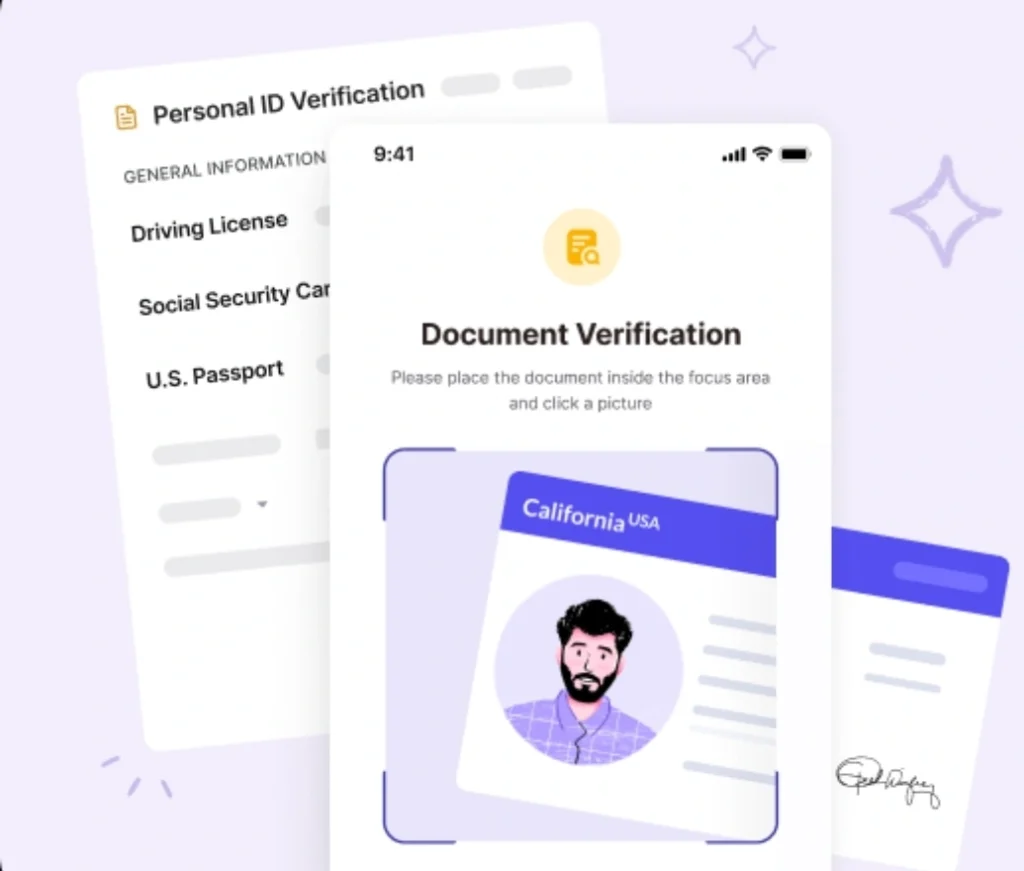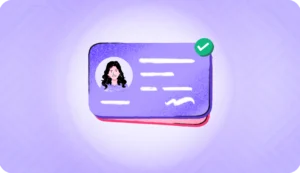The phenomenon of falsifying and exaggerating employment information is common. This is not an issue of a specific economy but of the whole wide world.
According to a survey report by CareerBuilder, 58% of employers have caught a lie on a resume. Be it an innocent lie about employment dates or a carefully mastered lie about an employment gap—any sort of lie disrupts the trust essential for building a successful partnership.
Therefore, employment verification is essential before you onboard a candidate and share your intellectual and financial resources with them. By verifying the work experience and skills of a candidate, you reduce the possibility of getting involved in job fraud.
Let’s broaden our understanding of employment verification with this blog post.
Understanding Employment Verification
Employment verification is a process of verifying the candidate’s work history and the information provided in their application. Doing so ensures that the candidate has the work experience to excel in the job.
Employment verifications involve verifying the employment history with details such as:
- Job title
- Date of employment
- Reason for leaving
- Salary details (in a few cases)
This screening process will help reveal any false claims made by the candidates.
Additionally, organizations may run a background check and analyze criminal records to avoid job fraud. Some organizations may also verify the work permit to confirm a candidate’s legal eligibility to work in a country.
All these pre-employment checks give a thorough overview of an individual’s abilities and fit for the organization. They instill the organization’s confidence in a candidate and equip them to make an informed hiring decision.
Generally, you need to verify employment details for up to 3 years for a junior-level representative. In the case of senior positions, you may need to verify the employment details of the past 5 to 7 years. However, for professional licensed occupations like a CA or a doctor, employment verification since the beginning of their professional careers is required.
Now, there are two prominent methods to verify employment history. Let’s discuss them.
Direct verification
Here, the hiring managers directly reach out to a candidate’s past and present employers for employment verification. They gather information about a candidate’s employment history and confirm its accuracy.
However, hiring managers may find that some past employers are out of business. In some cases, a candidate’s profile may also demand international verification. Additionally, running background checks, checks against criminal databases, and verifying identity make employment verification extremely challenging and time-consuming.

Managers hiring on a large scale cannot manage all the checks on their own, especially without automated tools. To streamline onboarding, these managers must find a way to run quick, thorough employment checks. This way, they won’t lose out on a potential candidate to some competing firm.
Verification services
Businesses sometimes rely on third-party service providers to verify the employment history of a candidate. These service providers run a quick background check and offer a thorough candidate report in usually less than a day.
While these service providers are usually quite helpful, their services can be pretty expensive. Additionally, if their UTV (unable to verify) rate falls higher than 10%, they aren’t quite equipped to carry out difficult verification checks.
That said, the employment verification method should help you streamline the hiring process and remove unnecessary delays.
Why is Employment Verification Important?
Employment verification helps businesses avoid any legal or financial trouble that comes with hiring the wrong person. An employee, on the other hand, gets easy approval for lending because of employment verification.
Let’s discuss the benefits of employment verification for each:
Benefits for Employers
Reduced risk of bad hires
Hiring is already a time-consuming and costly process. Through employment verifications, businesses can confirm the candidates’ application details and safeguard themselves from making bad hiring decisions.
Now, one can’t completely rule out the possibility of bad hires in the business. However, pre-employment screening processes and background checks empower employers to make informed decisions. They reduce the chances of hiring someone who may cause legal or reputational troubles.
Verification of education and skills
Businesses don’t need to spend more time worrying about whether the candidate they hired can perform their job. Running background checks on candidates can help verify their qualifications and degree claims.
Businesses can verify degree certificates using fraud detection software. Also, references from past employers can verify the candidate’s skills. This way, you don’t hire a person ineligible for a position.
Building a strong workforce
The people you hire will represent your business. You need to trust their character, values, and integrity. The pre-screening process makes it easier for you to trust the candidates with your firm’s secrets and trade activities.
Background checks on candidates before onboarding help reduce your employee turnover rate. This will later contribute to building a team that truly represents your business.
Benefits of employees
Employment verifications can be as useful for the employees as they are for the business.
It gives your potential employers a full overview of your professional career removing the need for need for extensive back-and-forth or questions about past roles.
Additionally, when you apply for a lease or mortgage, landlords would demand proof of financial stability. In fact, for any high lending situation, lenders are required to verify the income to sanction the loans.
In such cases, instead of rambling through pay stubs and tax returns, your work number would offer proof of income and confirm your ability to pay off the loan.
Lastly, employment verification helps government agencies establish your eligibility for social service programs. This way, you can get the benefits of unemployment programs and Medicaid without having to gather extensive documents on your own.
Maintaining Data Accuracy
The results of employment verifications play a significant role in determining whether the employer will hire a candidate. Employers must ensure that the data they gather and use is highly factual and free of bias.
It’s important that one gathers data from credible sources. In case you plan to contact the previous employers, make sure that the candidate is aware of it. A good rule is to cross-check the data with the candidates. This will reveal any incorrect information.
Additionally, it’s important to understand the concept of data privacy. Businesses must adopt practices to keep data safe and secure. The legal onus of leaking the information for marketing or any personal purpose is on the employer.
That said, employment verification is designed to help you make the right hire. Devising a robust verification process is essential to ensure fair hiring practices.
The Employment Verification Process
Now, let’s discuss a process to verify your candidates’ employment details.
Initiating verification
The Fair Credit Reporting Act (FCRA) requires employers to get a candidate’s written consent before doing background checks. This consent must state the purpose of running background tests. It must also outline the information that shall be verified.
Now, before starting the verification, create a standard form. This form should be a questionnaire. It should guide hiring managers in verifying candidates. It can contain sections such as
- Verification questions
- Candidate details
- Requestor’s information
- Consent form.
Hiring managers can fax or mail this form to past employers and gather quick responses.
Verifying employment details
Next, the hiring managers or service providers would verify the form data. This may include details such as:
Job Title and Dates of Employment
Employers can gather this info by contacting past employers or using the Work Number. If a candidate is employed, an appointment letter can verify their job title, responsibilities, and employment date.
Salary and Benefits
One cannot access the salary information without the consent of the candidate. Even with a candidate’s consent, the employer can deny offering such information.
In such cases, you may ask the candidate to provide proof through salary slips, pay stubs, and tax returns.
Reason for Leaving
Candidates most often mask their reasons for leaving. This information can be revealed by contacting previous employers and talking to their managers.
The verification process can confirm whether it was a resignation or a termination.
Such verification may also reveal any career gap that the candidate may have kept secret.
Additionally, you may ask for an unemployment verification form from a candidate. This will confirm their termination without cause.
Eligibility for Rehire
Employers can gather a more nuanced understanding of candidates’ performance and their professional behavior when a previous employer shows willingness to rehire them.
Additional Information Verification
Employers may need to verify additional information, such as:
Education Verification
Educational verification is crucial for jobs requiring specific qualifications. Verifying the educational details with the institutions helps you hire candidates who have the necessary expertise and skills to perform the job.
Also, this step would show if the candidate is using someone else’s credentials to get a job.
Professional Licenses
This applies to professions such as doctors, lawyers, and chartered accountants that require professional licenses. Employers must investigate the genuineness of such professional licenses before employing a candidate.
The verification process will either confirm the details provided by the candidate or reveal false claims made by them. Whatever the result may be, it will empower you to make a highly informed decision.
Sharing Candidate Information Responsibly
Each country has laws stipulating the information that firms can legally use to verify during hiring. Employers are expected to follow local rules on sharing candidate information.
Understanding FCRA Regulations
The FCRA regulates what third-party consumer reporting agencies (CRAs) can gather and use in background checks.
When hiring internationally, organizations must consider regional regulations and what information they can request. In any circumstances, employers cannot access the candidate’s health information. They cannot access the salary or income information unless the candidate grants it.
FCRA gives candidates control over what information an employer can access.
Obtaining Candidate Consent for Verification
Under the FCRA regulation, an organization cannot conduct employment verification or any sort of background check without the written consent of the applicant.
Also, if the employer wants to deny employment based on the verification, they must first complete the adverse action process. Only then can you inform the candidate of your decision.
Limiting Information Shared
Employment verification relies on data and facts. There’s no space for personal biases. An information provider (previous employer) cannot share false information. If found doing so, they may face severe repercussions in the form of heavy fines and civil lawsuits.
Additionally, the data gathered during the employment verification should be shared with the candidate, whether you hire them or not. However, you cannot share the data with anyone else. It’s the responsibility of the investigating party to keep the information safe and out of reach from outsiders.
Final Thoughts
While employment verification helps confirm the candidate’s work experience and job status, it also helps with another equally important aspect—establishing employment eligibility.
Every organization in the US is mandated by law to fill out IRS Form 9 before hiring a candidate. Filling out an IRS form requires you to verify identities and work eligibility.
For banks and other financial institutions, identity verification is a crucial part of employment verification. With Hyperverge’s identity verification software, you can verify and confirm the candidate’s identity in about 3 seconds. Hyperverge also verifies government IDs and documents. It checks for fraud against a vast database. This helps you make an informed hiring decision.
Its comprehensive fraud detection and identity-check services are ideal for running background checks on your candidates.
Try now.
FAQs
1. What information can be verified in an employment verification?
An employer or a consumer reporting agency can verify employment information. This includes previous employers, start date, job roles, and the reason for leaving. They also verify the candidate’s identity, work eligibility, and criminal record to make an informed hiring decision.
2. How long does the employment verification process take?
It may take anywhere from a day to a couple of weeks to verify employment history. International verifications, in particular, can take up to 3 weeks to run the background check. They have complex verification processes.
3. Can a former employer give a bad reference?
Former employers must be factual and unbiased when verifying employment. Giving negative information out of personal grudges may have legal consequences.
4. What if my former employer doesn’t respond to a verification request?
If the ex-employer doesn’t respond to a verification request, contact HR for help. In case the employer is out of business, you may offer verification through appointment letters and salary slips. You may also ask your colleagues or manager to help with verification.




